#Karzai
Explore tagged Tumblr posts
Text
Karzai: Afganistan'ın Parlak Geleceği Kız Çocuklarının Eğitiminde Yatıyor
Afganistan’ın eski cumhurbaşkanı Hamid Karzai, Afgan kızlarının okullara ve üniversitelere yeniden erişim talebinin temel bir hak olduğunu belirtti ve Afganistan’ın, eğitim imkanı sağlanmadan parlak bir geleceğe sahip olamayacağını vurguladı. Karzai, X (eski Twitter) hesabında yaptığı açıklamalarda, “Ülkemizin kız çocuklarının eğitim ve bilgi istemi, haklı bir taleptir ve müreffeh bir Afganistan…
#Afganistan#afganistan&8217;ın#Çocuklarının#eğitiminde#geleceği#haberler#Karzai#kız#parlak#tÜm#yatıyor
0 notes
Text
Afghanistan ~ Who's to Blame
The following is written by national, regional and state award-winning columnist and newspaper editor John Hourihan. On Sept. 11, 2001, terrorists attacked us. On Sept. 18, 2001, President Bush invaded Afghanistan. In 2002 the battle shifted to Iraq, under President Bush. Reconstruction began in Afghanistan. In 2003 Bush declared “Mission Accomplished.” In 2004 Karzai was elected president…

View On WordPress
#Afghanastan#Bin Laden#Bonn Conference#Iraq#John Hourihan#Kamala Harris#Karzai#Lisbon#NATO#Portugal#President Biden#President Bush#President Obama#Taliban#terrorists#Trump
0 notes
Video
youtube
عمر خطاب: نواسه شرابی پيغامبر سید مخدوم رهین وزیر کرزی Drunk Holy Karza...
0 notes
Text
Eravamo insieme davanti alla televisione mentre sullo schermo scorrevano le immagini della ritirata degli americani dall’Afghanistan, anno di grazia 2021, e l’arrivo dei talebani in varie città del paese. Le ragazze di Kabul fuoriuscivano dallo schermo, con i loro quaderni, i loro zaini, le loro matite, la loro voglia di non perdere l’istruzione e la vita che in quei decenni di relativa calma avevano ottenuto a suon di sacrifici. Quelle ragazze di un’altra latitudine le sono scoppiate letteralmente nel cuore. E ho visto hooyo [=mamma] tremare di rancore. Più volte si è alzata in piedi e si è avvicinata alla televisione. Più volte, con un gesto tanto meraviglioso quanto inutile, ha cercato di sorreggere quelle ragazze stanche e affamate di un altro continente con le sue mani minute che accarezzavano il vetro dello schermo. La vedevo mentre cercava di tendere loro il braccio per teletrasportarle sulla pista dove aerei dalla pancia grossa si dirigevano verso una salvezza qualsiasi. Le facevano troppo pena quelle ragazze giovani e intraprendenti, immerse come grumi di merda nel canale di scolo che costeggiava l’aeroporto internazionale Hamid Karzai.
“Dovrebbero stare in un’aula, davanti a una maestra o a un maestro,” mi ha detto con voce sconvolta, adirata. “Davanti a una lavagna, con in mano un gesso, una penna, una possibilità. Accidenti, devono stare in classe con una maestra o un maestro che gli apre una finestra sul mondo.” “Invece, hooyo,” sussurro io, “sono grumi di merda in un canale di scolo.” Grumi di merda destinati a diventare grumi di sangue. Sì, sangue e materia cerebrale. Quando il telegiornale ha dato la notizia di persone assiepate all’aeroporto di Kabul, ho visto la rabbia di hooyo trasformarsi prima in furia e poi in lacrime. Per giorni ha camminato nervosa dentro casa, per strada, nelle terre della sua fantasia, alla ricerca di qualcosa che riuscisse a calmare le raffiche del suo cuore ferito. Era arrabbiata per la triste sorte che stavano subendo le ragazze di Kabul, ma era arrabbiata anche per se stessa. Si era rispecchiata in quelle giovani dagli occhi da cerbiatto, ragazze con quaderni e penne in mano, e si era chiesta perché a molte persone, più donne che uomini, sia ancora proibito sognare.
Igiaba Scego, Cassandra a Mogadiscio, Bompiani (collana Narratori Italiani), 2023¹; pp. 148-149.
#Igiaba Scego#letture#leggere#Somalia#narrativa#famiglia#Cassandra a Mogadiscio#autobiografie#guerra#Afghanistan#citazioni letterarie#generazioni#rifugiati#colonialismo#libri#diritti delle donne#diaspora#adolescenza#talebani#profughi#Hamid Karzai#emigrazione#infanzia#sentimenti#Kabul#letteratura italiana contemporanea#origini#umanità#memoria#intellettuali italiani
12 notes
·
View notes
Text
„Jedes Mal, wenn wir die Qual anderer ignorieren und daneben stehen und zusehen, handeln wir nicht nur gegen unsere eigenen Interessen, sondern wir verletzten einen Teil der Menschlichkeit.“
Hamid Karzai
#witze#wmlz#meme#zitate#lustiges#humor#funny#lol#funny memes#deutsch#Qual#ignorieren#Menschheit#Hamid Karzai
1 note
·
View note
Text
every time I see pro/anti-ana mentioned the first thing I think of is the afghan national army
1 note
·
View note
Text

elaborate on this.
anyways he's the ancient hero of graad but... okay hold on i'm getting sidetracked

pius was in iilmaraa... ramout karzai went to the erg desert which okay carefully examining the situation we dont actually know what isola the erg desert is on, im just assuming its in the iilmaraan isola because khan is stated to be from there and he's the guy with an obsession about this ancient hero of graad. he's from Amistad's heroic epic but we dont know where amistad is...
although we know ramout karzai went to the erg desert to seek an audience with god so he postdates pius but we dont know how long the perikarnassian era was...
perhaps khan is just into him because he's a cool person who disappeared? so maybe he isnt iilmaraan but it still seems a little out of place...
oh. ramout karzai predates the splitting of the isolas.
16 notes
·
View notes
Text

Sgt. Nicole Gee, a maintenance technician with the 24th Marine Expeditionary Unit, cradles an Afghan infant during the evacuation at Hamid Karzai International Airport in Kabul, Afghanistan on August 24, 2021.
The 23 year-old wrote "I love me job" on her Instagram caption, as her unit was tasked with processing thousands of Afghan and American evacuees through the airport gates.
Just two days later, on August 26, 2021, Sgt. Gee and 12 of her fellow service members were killed in a suicide bombing at the airport.
Fair winds and following seas to Sgt. Gee and those who gave their lives to help protect and save others. Your sacrifice was not in vain and you will never be forgotten. Semper Fi. 🇺🇸
#usmc#us marines#sgt nicole gee#kabul#airport#afghanistan#baby#military#history#never forgotten#rest in peace
169 notes
·
View notes
Text



German snipers of the PSK (Precision Shooting Command) stand guard during Afghan President Karzai's visit to Berlin. A PSK team usually consists of two officers (a shooter and an observer) and is rarely visible to the public outside of state visits.
K.-H. Aberle, May 18, 2012
15 notes
·
View notes
Text
İran'ın Eski Dışişleri Bakanı Yardımcısından Karzai ve Haqqani Görüşmesine Tepki
Seyyid Resul Mousavi, Hamid Karzai’nin Taliban’ın İçişleri Bakanı Sirajuddin Haqqani ile gerçekleştirdiği görüşme ve Haqqani’nin bir akrabasının öldürülmesi dolayısıyla duyduğu üzüntüyü ifade etmesi üzerine ağır eleştirilerde bulundu. Mousavi, savaşın doğasını vurgulayarak, iki grup arasındaki çatışmanın sadece bir savaş değil, aynı zamanda birbirlerini tanımama durumunun da olduğunu ifade…
#&8220;İran&8217;ın#Afganistan#analİz#Bakanı#dışişleri#eski#görüşmesine#haqqani#Karzai#tepki#ve#yardımcısından
0 notes
Text
by Brendan O’Neill
And yet there is something off, even something nauseating, in all the Western finger-wagging. It isn’t only Cameron. US president Joe Biden has also weighed in, saying he is ‘outraged’ by the killing of the aid workers. You can’t help but wonder whether he directed similar outrage at his own nation’s military when 37 Afghanis at a wedding party, mostly women and children, were killed by mistake in a US airstrike.
‘Stop killing Afghan civilians’, the then president of Afghanistan, Hamid Karzai, said to the newly elected US president, Barack Obama. And who was Obama’s vice-president? Biden, of course. You would think a man whose own military has killed huge numbers of people in error would understand that these things happen, even if every decent person would rather they didn’t.
Vast numbers of civilians have been killed by accident by the US in recent years. At another wedding party in 2004, this time in Iraq, 11 women and 14 children were killed by American fire. Was there a ‘full, transparent explanation’ for that calamity?
Terrible accidents happen in war. That’s because war is hell. If you hate the war in Gaza, as you should, then you should aim your ire at Hamas, the virulently anti-Semitic terror group that started this war with its pogrom against the people of southern Israel on 7 October. The seven decent souls of World Central Kitchen would be alive today had Hamas not taken the decision to visit its racist barbarism on the Jewish State.
For once war starts, error becomes unavoidable. There are few wars in history – none, perhaps – in which innocents have not perished in the violent maelstrom. What is striking about Israel’s mistake is that it is not being treated as ‘friendly fire’ at all. Instead it is held up as proof of Israel’s evil, evidence of its malevolence.
47 notes
·
View notes
Video
Arash Get2DaPoint Humor: Temor Shah Hassan vs Makhdoom Raheen
#youtube#He is right about my daddy#TemorShahHassan ArashRaheen AfghanComedy Karzai MakhdoomRaheen#BaharTV#ArashRaheen TemorShahHassan AfghanComedy BaharTV
0 notes
Text
Of the many missteps the United States made in its two-decade war in Afghanistan, one of the early ones involved a missed opportunity with the Taliban. In December 2001, just weeks after the U.S. invasion of Afghanistan, the Taliban made an offer to the Bush administration: Its fighters would be willing to lay down their arms, provided they could live “in dignity” in their homes without being pursued and detained.
The offer was made in the form of a message to Afghan political leader Hamid Karzai. Had it been accepted, it may have prevented years of bloodshed and a long American occupation that ended in ignominy. But the United States at the time was reeling from the attacks of 9/11 and determined to eviscerate the group that had hosted al Qaeda leader Osama bin Laden and refused to hand him over. U.S. officials did not even respond to the offer.
Zalmay Khalilzad, a U.S. diplomat who dealt with Afghanistan for years, had a chance to ask the Taliban about that early truce offer while negotiating with the group much later—in 2021. He was struck by the response. “They thought that 20 years of war and all the loss of life on all sides was due to that mistake, as they saw it.”
This week marks three years since the Taliban marched on Kabul and regained control of Afghanistan. The hasty American retreat—and specifically the scenes of chaos at the Kabul airport—stand as a foreign-policy debacle for the Biden administration.
But America’s failure in Afghanistan is a much longer story. To try to understand it, Foreign Policy set out to explore why for two decades some of the world’s most experienced negotiators failed to reach an agreement that would have brought lasting peace to the country. The result of the reporting is a seven-episode season of our podcast, The Negotiators, produced in partnership with Doha Debates, and including interviews with key U.S., Afghan, and Taliban figures. You can hear it on our website or on any of the podcast platforms.
Based on conversations with the main actors, it is a story of misunderstandings, missed opportunities, and complacency—coupled with an American predilection for military action over diplomacy following the shock of 9/11. And while the Taliban were no pacifists themselves, they did at least show an early readiness to negotiate.
The misunderstandings and missed opportunities began to stack up in the closing stages of the U.S. invasion, when the Bush administration had the Taliban on the run and its focus was starting to shift toward Iraq. Uninterested in what it called “nation-building,” the administration asked the United Nations to shoulder the task of creating a new political order.
The result was a hastily convened conference in December 2001 in the German city of Bonn, which anointed Karzai as the new interim leader. But in line with U.S. wishes, the Taliban were excluded from the cross-section of Afghan political groups invited to attend.
For the U.N. and most of the Afghan delegates, the meeting was an opportunity to launch a peace process that would end the country’s forever war—which had been underway since the Soviet invasion in the late 1970s.
But for the Bush administration, the Bonn conference was simply a means “to consolidate victory in the war on terror,” according to American political scientist Barnett Rubin, who was then advising the U.N. envoy in charge of the meeting. “You can look through all the statements of all U.S. officials,” he said. “You will not find a word about peace in Afghanistan.”
That new order, agreed upon at the Bonn conference, did include plans for elections and a new constitution enshrining—among other things—rights for women. It also ushered in a period of optimism in Afghanistan, with millions of Afghan exiles returning home over the next few years, hopeful at that point that their country was on a path to stability with the West’s support.
But the Bonn agreement, patched together quickly, ended up cementing old divisions and creating new ones. “The underlying political issues were not even articulated at Bonn, let alone resolved,” Rubin said. It led directly to the Taliban taking up arms again, aided by the group’s sponsors in neighboring Pakistan, who also felt sidelined.
In response, the United States doubled down on its counterterrorism goal of trying to destroy the Taliban. Even figures who had been trying to maintain a dialogue were arrested, such as the Taliban’s former ambassador to Pakistan, Mullah Abdul Salam Zaeef.
In the years that followed, a weak, fractured, and aid-dependent Afghan government would struggle as the Taliban’s insurgency expanded. Their support grew as the death toll from U.S. night raids and airstrikes rose. But it was the Taliban, along with some of America’s European allies, who were first to revive efforts to talk.
One of those allies was Norway, which had troops in Afghanistan but also experience mediating in other conflicts. Lisa Golden, director of the Norwegian Foreign Ministry’s Peace and Reconciliation Department, said her government had quickly concluded that “a purely military solution wasn’t going to bring peace and stability to Afghanistan.” The ties it built up with Taliban representatives led to a series of meetings in hotel rooms, “with the fruit basket that they provided between us,” Golden recalled.
To show his support for the talks, Taliban leader Mullah Mohammad Omar dispatched a trusted aide in 2009 to establish contact with both U.S. and European officials.
But nearly a decade into the Afghan war, entrenched American attitudes toward the Taliban made it difficult to get any talks started. Because of the risk that the United States would detain him and bundle him off to Guantánamo Bay, the aide, Tayyab Agha, had to work through intermediaries and travel clandestinely to the Middle East to set up meetings.
President Barack Obama had inherited the war by now and appointed veteran U.S. diplomat Richard Holbrooke as his envoy for the region. Part of Holbrooke’s brief was to weigh talking to the Taliban, and he brought in Rubin as one of his advisors. But the United States still had “no policy toward a political settlement,” said Rubin, nor on how to engage with the Taliban.
When U.S. officials finally got the go-ahead to meet, it was only Agha, the Taliban emissary, who had a set of proposals and demands—the American side came empty-handed. Holbrooke’s sudden death, in late 2010, again stalled this tentative U.S. attempt to talk to the Taliban. And when his replacement was appointed, Rubin and his colleagues found themselves undermined by leaks from the Pentagon and the intelligence community, who were putting their hopes in the U.S. troop surge then underway, not peacemaking. “Most of the government was against us,” Rubin said.
And so it went, with misunderstandings and disagreements snarling efforts to promote talks, while the bloodshed mounted. A deal for the Taliban to open a political office in Qatar in 2013 fell apart when the Afghan government objected to its quasi-official status. By then, it was two years since the United States had killed bin Laden and the Pentagon was reducing its troop count, with plans for Afghan government forces to take the lead. But as their spokesperson, Suhail Shaheen, boasted at the time, the Taliban’s power had only increased.
President Donald Trump brought a different approach to the White House—a determination to withdraw American troops no matter what it meant for the Afghan government. But by then, U.S. leverage had weakened. “Instead of trying to negotiate at the apex of U.S. power and the nadir of Taliban power and capability in Afghanistan, we finally got serious about it as the U.S. was clearly on the way out the door and the Taliban was making steady advances,” said Laurel Miller, who served as acting U.S. special representative for Afghanistan and Pakistan at the start of the Trump administration.
Trump instructed Khalilzad to negotiate a withdrawal—but that meant that the chief U.S. concern was getting out safely, not achieving an Afghan peace settlement. This was underlined by the fact that only American and Taliban negotiators met in the early stages, consigning the Afghan government to the sidelines. The arrangement mirrored the way the Taliban were left out at Bonn in 2001.
The United States and the Taliban did manage to strike a deal: the Doha Accord, which was signed in February 2020. It was supposed to be followed by power-sharing negotiations between the Taliban and the Afghan government. But since the United States had already agreed on a date for withdrawing its forces, the Taliban had no real incentive to bargain further. “It made it very easy for the Taliban just to wait us out,” said Gen. Joseph Votel, head of U.S. Central Command from 2016 to 2019.
Hamdullah Mohib, who served as the national security advisor to Afghan President Ashraf Ghani at the time, accused Khalilzad of going behind the Afghan government’s back in his negotiations, calling it colonial behavior.
Khalilzad, in an extended interview for the podcast, rejected these accusations and insisted he kept Ghani and his officials fully informed. But he acknowledged “there was a conscious decision” not to tie America’s withdrawal to an agreement between the Ghani government and the Taliban, because of concerns that any linkage would delay its exit. Ghani’s government struggled to adjust to the new reality created by the agreement—and failed to strike a deal with the Taliban.
For older Afghans who had lived under the first Taliban regime and others who had prospered under the umbrella of the 20-year U.S. occupation, the group’s dramatic return to power in August 2021 was devastating. Many Afghans swarmed the Kabul airport to board evacuation flights. Afghan women braced for a new reality—with severe restrictions imposed on their everyday lives.
Three years later, girls above grade six are still not allowed to attend school. While the international community pressures the Taliban to relax the restrictions, the group chafes at the West’s continued embargo and its refusal to recognize its government.
In the interview, Khalilzad conceded that Afghanistan had been a lesson for the United States in “the limits of what military force can achieve.” Washington had made many mistakes in its war on terror after 9/11, in both Iraq and Afghanistan, he said. “The policies that we pursued, the forces we strengthened, in a significant way contributed to the changes that were inconsistent with our values and, arguably, at least after a certain period, with our interests as well.”
20 notes
·
View notes
Text
Trump Honors Afghanistan Troops as ABC, CBS, NBC Morning Shows Ignore Anniversary
President Donald Trump paid his respects to the 13 U.S. troops who were killed three years ago during President Joe Biden’s withdrawal from Afghanistan — while the morning shows on the major networks ignored the anniversary.
Monday, August 26, 2024, marked three years since the day a suicide bomber affiliated with the local branch of the so-called “Islamic State” (ISIS) killed 13 American service members and wounded dozens more at Kabul’s airport — while also murdering roughly 170 local civilians who were trying to flee the country.
Trump visited Arlington National Cemetery, laying a wreath alongside Marine Corporal Kelsee Lainhart, who was partially paralyzed by the blast.
NewsBusters.com noted that ABC, CBS, and NBC ignored the three-year anniversary on their Monday morning shows:
Monday marked three years since the deadly Islamic terror attack in Kabul, Afghanistan at Hamid Karzai International Airport that murdered 13 American soldiers, 170 Afghans, and left over 150 people wounded. Instead of even briefly acknowledging this painful day for American families in what became the symbol of the Biden-Harris’s administration’s withdrawal from Afghanistan, ABC, CBS, and NBC completely ignored it on their flagship morning news shows. To repeat: not a word from ABC’s Good Morning America, CBS Mornings, and NBC’s Today about the sacrifice of the brave Americans standing guard at Abbey Gate. The networks shamefully adopted the mold of President Joe Biden and Vice President Kamala Harris in being radio silent (aside from paper statements released from their handlers). In contrast, cable news shows that aired during that same block — Fox Business Network’s Mornings with Maria, Fox News Channel’s Fox & Friends, Newsmax’s Wake Up America, NewsNation’s Morning in America, and even CNN News Central — all mentioned it multiple times.
Neither President Biden nor Vice President Kamala Harris visited Arlington, though both issued statements.
7 notes
·
View notes
Text
Spotlight: Ultra Magnus
Hit it, Mags!

"independent war crimes arbiter ultra magnus" would have been really cool to have


Swindle's first appearance!

comics are fun


there's a whole crowd of the alien dudes also i do want to say it's fun to see all these other aliens showing up
First Alien: You have no authority here, Cybertronian, and Swindle...is under my protection. Guards...
First Alien: execute him!
Ultra Magnus: hm
we get to see his HUD and it's focusing on each of the weapons the guards have

nnnot entirely sure i like this ultra magnus design tbh
one guy starts reaching for his weapon
Ultra Magnus points at him
Ultra Magnus: don't
guard dude takes his hand away from his weapon
"Hey, Magnus!"
Ultra Magnus and Guard Dude look up

he fires it and Ultra Magnus jumps out of the way

Swindle collapses on his back
Ultra Magnus points his very large gun down at Swindle
Ultra Magnus: Just...
Ultra Magnus: ...give me an excuse!
Ultra Magnus slaps glowing cuffs on Swindle
then he points at the guy Swindle was working with
Ultra Magnus: as for you, Karzai Lorcha, you have a bad habit of offering miscreants safe harbor in return for, shall we say, utilization of their violent or criminal proclivities
Ultra Magnus: do so again, for other wanted Cybertronians...
Ultra Magnus:…and I'll bring the walls of Zull tumbling down

Swindle sneers at him
Swindle: Well, see, I'm not so sure. In my experience, everyone - no matter how unbending they may seem - wants something
Swindle: even you, Magnus...
Ultra Magnus turns and starts walking away
Ultra Magnus: no, nothing you have to offer would make me compromise my sworn duty
Swindle: oh yeah? not even…Scorponok?
Ultra Magnus turns his head towards Swindle
(heh)

Scorponok: the winner in the "how many different war crimes can you commit" contest
Ultra Magnus: one of the fundamental tenets of the allied Code of Interplanetary Conduct is the Non-Interaction Accord...
Ultra Magnus:...which limits the sharing of Cybertronian science

"…and pooling resources to create new and deadly variations on a militaristic theme" but hm. "morally ambivalent species" hm. hm
there's a picture of a crater
Ultra Magnus: the mutual aspect of the arrangement lasts only as long as it takes Scorponok to absorb the choicest cuts of local innovation and infrastructure. After which...
Ultra Magnus:...he carefully erases all traces of his machinations, and moves on
Ultra Magnus fiddles with the controls of his ship
Ultra Magnus: Grudgingly, I concede that Swindle is right. If he knows Scorponok's current whereabouts, and if that knowledge means I can take him unawares before he has a chance to cut and run...
Ultra Magnus:...then he does have something I want
"But is it enough to make me 'bend'? In my book, one compromise leads to another…and another…and pretty soon…"
Ultra Magnus crosses his arms
"…you've crossed the line you're supposed to be holding"
there's a shot of Ultra Magnus' ship leaving a red planet
he did, in fact, agree to cut Swindle loose
but left him on "the remotest, least savory trading post of the quadrant" without a cent to his name UM, did you steal Swindle's money and possessions? for shame :p okay but no seriously did he

it's the planet of the 80s!



Ultra Magnus is in truck form, scoping the place out
"But I have to be sure"
wait no, green guy is his holoavatar
next panel is him talking to a receptionist in purple
UM narrating: replicated identity documents and a certain amount of creative commercial bluster get my holomatter simulacrum past security and reception...
"…and into a meeting with the consortium's Director of Marketing"

this Ultra Magnus (international lawman of mystery) is a pretty fun character
"...and a quick realignment of the holomatter matrix"
now he looks like the director
"...I'm all the way in"

"Cybertronian technology, without a doubt. Enough of it, anyways, to let me know, beyond a shadow of a doubt, I've found what I'm looking for"
he goes to examine the tube
"I take a closer look…"

trauma buffers, huh

love it

"…I feel it!"
somehow the electricity travels through…idk what medium, to electrocute UM's cab

"It's a race against time"
"Can I reach him before he strips out all the essential data and hardware…"

it's 3v1
and UM is wondering about his Scorponok is planning on taking the organic-Cybertronian blend to a whole other level
"If so…"
they start shooting at Ultra Magnus
"Then stopping him…"
the shots basically just bounce off of him
"is an even greater priority"
Ultra Magnus drives off, having knocked them out
"I spare no thought for my would-be executioners. They're just animated, auto-piloted armour. The real enemy..."
"...is within"
Ultra Magnus arrives on the rooftop, and goes back into robot mode
"And, en route to Scorponok's sub-surface lair..."
"...I get into character"
Ultra Magnus, out loud: Scorponok...


Scorponok: in the past, I've simply wound up my operations, and moved on, but I've on the verge of something quite breathtaking in scope here…so…
Scorponok: it's you who must go
he throws Magnus back
Scorponok: as in dead and gone!
he throws Magnus through a wall
Scorponok: since our paths last crossed, Magnus, there have been…
his tail is glowing


Scorponok: Zarak? No!
Scorponok: Get back! I can't st-
unfortunately he can't stop it from firing
but Ultra Magnus uses the distraction to get out of the way

Magnus grabs his gun
Scorponok: Maaagnus...
Scorponok: This is all your fault!
Magnus: Scorponok, stop!
Magnus: Don't...make me...
Ultra Magnus fires and hits Scorponok in the corner of his head
Scorponok walks it off, Ultra Magnus is too winded
UM narrating: somehow, driven onwards by some ruthlessly stubborn streak of self-preservation...
"...he doesn't go down"
"And by the time I'm on my feet..."

"…whatever it takes…"
"…I will bring him to justice!"

decepticon high justice huh
"I will never forget that vow, but as time passes I start to wonder...just how far I will go to get the job done!"
Swindle: so...let's deal!
The end?
and that's the UM spotlight
some notes:
(my friend said this originally, I slightly rephrased it) this is very mildly spoilery but this shows a repeated pattern of behaviour with Scorp where he gets protective and melodramatic over his modified partners in crime
you know this was UM's first appearance also I think first appearance of Swindle and the term "tyrest accords" it does imply that the Decepticons do have some kind of war crimes that overlap with the Autobot idea of war crimes, which is interesting and also that there's some level of cooperation regarding rogues from both sides
on the topic of Furman:
I think he's quite good at storytelling within a comics medium friend: his flow is great friend: barber and scott both have their hand in multiple layers but furman specializes in doing one layer really well
on the topic of Cybertronian-alien relations:
friend: let's remember, Ultra Magnus in this issue:
in one he blows up a base, threatens people, and shuts down a fruitful business relationship
here he's breaking into a semi military think tank with the intention to shut it down
and in between those he dumped swindle on a random space port, probably without actually telling any of the locals about it
me: ultra magnus, may i remind you, canonically has a good rep with the Galactic Council he's the "calm, straightlaced one" yeahhhh there's a reason they go around in disguise lol
other friend: cursed thought Cybertronians are the Spike Witwicky's of the galaxy
(we all agreed that this was accurate and also we hated it so much)
on the topic of Scorponok:
me: scorponok is the literal worst but somehow he is like a sad wet worm that you see on the sidewalk and want to rescue friend: scorponok is the literal worst but at the same time you can't help but want him to achieve his dream of settling down somewhere and making an army of increasingly fucked up cyborgs
there was the detour where I talked about my scorp&tarantulas teamup AU but some of it's spoilery for Laurafic (though tbh even mentioning this is spoilery) buuut I'm gonna share some of it anyways because it's funny
me: scorp gives off the vibes that he would go 0 to 100 in terms of attachment friend: i don't even think there would be a clear line from the 0 to 100 friend: he'd be monologuing about how he's using his creations to take over this pitiful planet and the next day you're wondering if packing a box lunch is a necessary part of the plan and if you feel like arguing about it me: they (Scorp&Tarantulas) wouldn't fix each other and they wouldn't make each other worse, but instead, some secret third thing friend: they'd support each other's hobbies in a way thats healthy for them and apocalyptic for the wider world
unfortunately for spoiler purposes I have to stop there but it did end up discussing how introducing Tarantulas to Homestuck should probably be illegal under the Tyrest Accords
(and also we talked about some interesting AU stuff with Scorp but it's spoilery for some more immediate comics stuff. so. putting a pin in this one)
and I'm gonna do a few Hot Rod notes as a separate post cause that came up then too
2 notes
·
View notes
Text
🎵Doomed Commercial Area
3. "I'm not sure, Kim... but I think I can hear someone talking upstairs."
KIM KITSURAGI - "Wait, really?" He looks up at the ceiling. "Maybe it's coming from behind those safety curtains we saw upstairs?"
3. Smear your hands with coal.
CENTRAL FURNACE - A lush layer of coal now covers your skin, sinking into the wrinkles. Your hands look ancient.
INLAND EMPIRE [Medium: Success] - You feel the spirit of Ramout Karzai, ancient hero of Graad, pulsing through you. All that's left is to cover your face in war-paint.
Hadramut Karzai! Smear your cheeks black with coal.
No, let's not express ourselves. Let's just wipe our hands clean on our pants.
INLAND EMPIRE - Three dangerous stripes appear onto your cheeks, telling stories of your wild soul.
KIM KITSURAGI - "What... what are you doing?"
"I am the reincarnation of an ancient Iilmaraan warrior."
"Nothing!" (Wipe your face clean.) "Sorry, that was stupid."
KIM KITSURAGI - "Please wipe your face clean, officer."
CONCEPTUALIZATION [Medium: Success] - No, you're a proud warrior, keep it.

[Authority - Medium 11] Don't wipe it.
Wipe it clean.
+1 Kim trusts you.
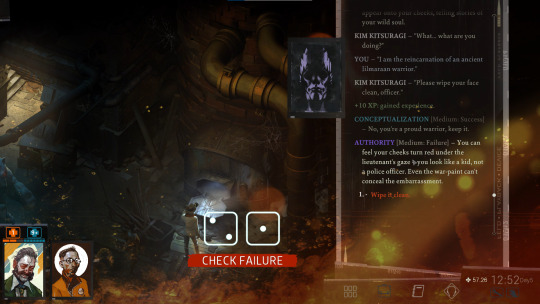
AUTHORITY [Medium: Failure] - You can feel your cheeks turn red under the lieutenant's gaze -- you look like a kid, not a police officer. Even the war-paint can't conceal the embarrassment.
Wipe it clean.
KIM KITSURAGI - "Thank you," the lieutenant nods. "So, where were we?" He turns back to the furnace.
4. "Those voices I heard... Maybe it's the malignant Entity? Plaisance said it lives in a chimney."
KIM KITSURAGI - "You're right, the rooms do look like they're connected. But *malignant Entities* don't exist -- at least not the *supra-natural* kind."
RHETORIC [Medium: Success] - Always has to be the sceptic, this man...
HALF LIGHT [Medium: Success] - Then what was the chatter you heard?
6. Kick it with your foot.
CENTRAL FURNACE - A hollow ring echoes through the furnace. Your toe hurts.
-1 Health +1 The Destroyer

5. [Physical Instrument - Medium 10] Yell "Hello!" into the furnace.
+1 Kicked the furnace. +1 Called Slipstream SCA again. +1 Helping Soona with research.
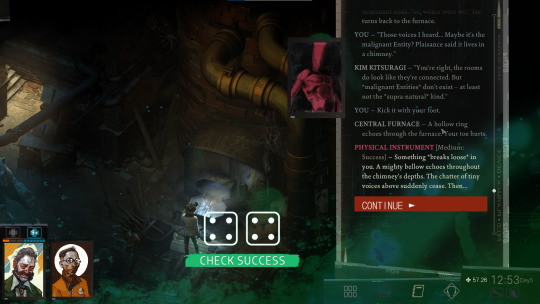
PHYSICAL INSTRUMENT [Medium: Success] - Something *breaks loose* in you. A mighty bellow echoes throughout the chimney's depths. The chatter of tiny voices above suddenly cease. Then...
CENTRAL FURNACE - "Hello?" you hear a woman's voice answer.
INLAND EMPIRE [Easy: Success] - You've awakened the entity!
"This is the Remote Viewers Division! Identify yourself!"
"I summon the ghost of this Doomed Commercial Area. Answer me, spirit!"
"Hello! Are you there? Speak to me!"
CENTRAL FURNACE - "Hello! Did you say anything?" There's a pause. "I can't hear you, please come upstairs! There's a safety curtain on the second floor, I'll open it!"
+5 XP
Level up!
PERCEPTION (HEARING) [Easy: Success] - You hear a low rumble upstairs -- the sound of a curtain being pulled aside.
KIM KITSURAGI - The lieutenant nods, then points upstairs. "After you, officer."
6. [Leave.]
We're not quite done down here yet.
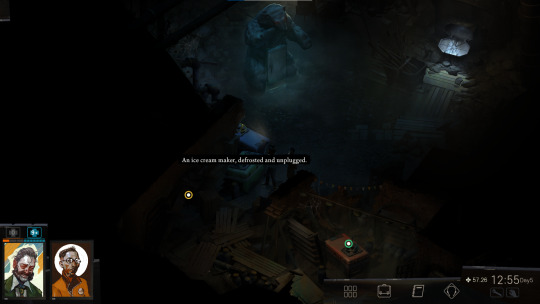
An ice cream maker, defrosted and unplugged.
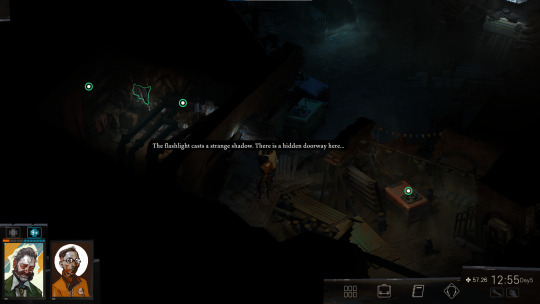
The flashlight casts a strange shadow. There is a hidden doorway here...
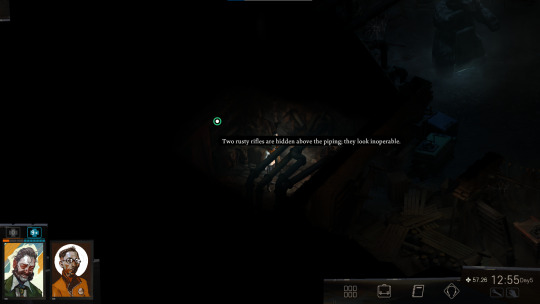
Two rusty rifles are hidden above the piping, they look inoperable.
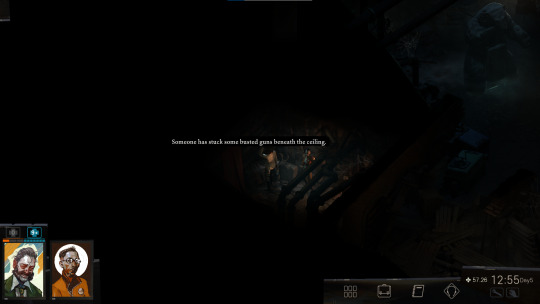
Someone has stuck some busted guns beneath the ceiling.
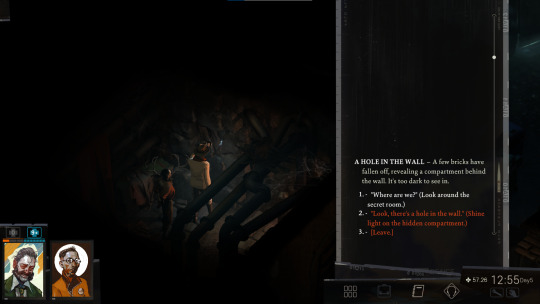
A HOLE IN THE WALL - A few bricks have fallen off, revealing a compartment behind the wall. It's too dark to see in.
"Where are we?" (Look around the secret room.)
"Look, there's a hole in the wall." (Shine light on the hidden compartment.)
[Leave.]
KIM KITSURAGI - "Seems like an old bunker from the Revolutionary period. Look at all those rifles..." He points up, at the rifles under the ceiling. "Must be an old weapons cache."
2. "Look, there's a hole in the wall." (Shine light on the hidden compartment.)
KIM KITSURAGI - "There is, yes. And there also appears to be something *inside* the hole... Interesting. Do you want to take a look?"
"Okay, I do…" (Look inside.)
"No, you do the honours." (Back off.)
A HOLE IN THE WALL - Your hand reaches deep into darkness and spider webs, rummaging around. You find rusty rifles, hidden away...
"Rifles, Kim!"
Inspect the rifles.
KIM KITSURAGI - The lieutenant steps closer, curious: "Are these any good?"
Inspect the rifles.
A HOLE IN THE WALL - Most of them are rusty and inoperable like the rest, but one catches your eye -- a bolt action model with a fine wood stock. In better cosmetic order than the others.
AUTHORITY [Easy: Success] - Take it! You're a police officer. Police officers carry guns.
"This one looks nice." (Take the rifle.)
KIM KITSURAGI - "An old Belle-Magrave, from the Revolution," the lieutenant notes with approval. His eyes are gleaming. "Seems to no longer be functional, but still -- a beautiful thing, in its own way."
Item Gained: Antique Belle-Magrave rifle
"Could the murder weapon we're looking for be similar?"
KIM KITSURAGI - "It's the same *type* of weapon, yes. A breechloader. An interesting coincidence that we should find something so similar. But I'm afraid our search for the real murder weapon must continue."
2. "What does this mean -- a rifle here?"
+1 Reputation
KIM KITSURAGI - "It means there are firearms -- albeit inoperable -- still lying around in Martinaise. It's an interesting coincidence, I would say. Might come in useful in the future."
+5 XP
EMPATHY [Trivial: Success] - He likes this find.
3. [Leave.]
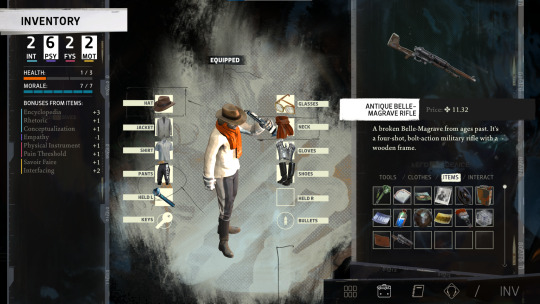
ANTIQUE BELLE-MAGRAVE RIFLE
A broken Belle-Magrave BM446 from ages past. It's a four-shot, bolt-action military rifle with a wooden frame. It misses a bolt-spring and the mechanism is jammed shut.
Hmm... you know what?
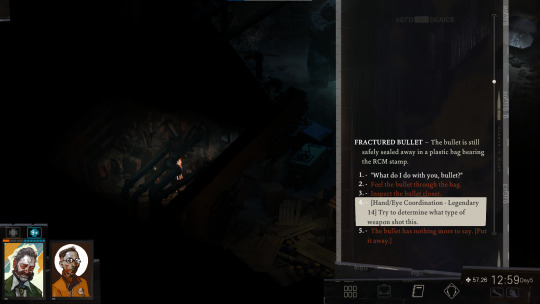
FRACTURED BULLET - The bullet is still safely sealed away in a plastic bag bearing the RCM stamp.
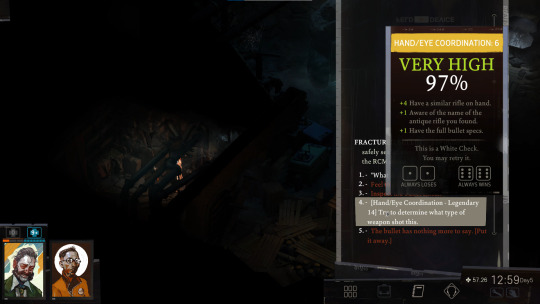
4. [Hand/Eye Coordination - Legendary 14] Try to determine what type of weapon shot this.
+4 Have a similar rifle on hand. +1 Aware of the name of the antique rifle you found. +1 Have the full bullet specs.
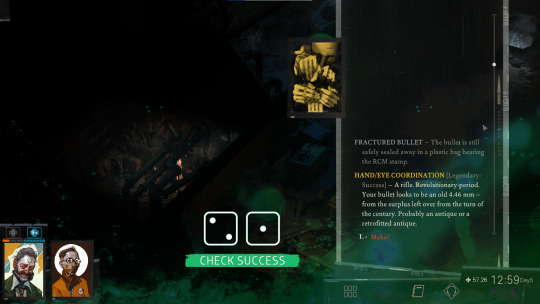
HAND/EYE COORDINATION [Legendary: Success] - A rifle. Revolutionary-period. Your bullet looks to be an old 4.46 mm -- from the surplus left over from the turn of the century. Probably an antique or a retrofitted antique.
Make?
HAND/EYE COORDINATION - The 4.46 calibre was widely used with the *Belle-Magrave* rifle, a Revacholian manufacturer. The B-M dominated the battlefields of the Insulindian theatre of the Antecentennial Revolution, 50 years ago.
Incidentally, you have just such a rifle with you. The dusty old thing you found hidden in the basement below the commercial area. It's unusable, sadly. If it were, the bullet would *probably* fit the chamber.
+5 XP
Is anyone still making these rifles?
HAND/EYE COORDINATION - No, but Zieleger, a major firearm manufacturer, ended up with a surplus after the war, so there are still a lot of these old military rifles floating around, usually broken. The quality was appalling.
Who uses Belle-Magrave rifles these days?
HAND/EYE COORDINATION - Antiques enthusiasts, guerrilla fighters in distant countries, a few lucky Jamrock bangers. You're looking for the same thing you found in that hidden weapons cache -- only in working order.
KIM KITSURAGI - "Hmm..." The lieutenant jots something down in his notebook. "What are you thinking? Bullet?"
4. "I think I know where this came from." (Dangle the bag thoughtfully.)
KIM KITSURAGI - "Okay. And?"
"The shot probably came from a Belle-Magrave rifle."
"I mean... have some ideas, but I can't be sure..."
KIM KITSURAGI - "An antique. That makes sense. There can't be many breech-loading rifles floating around in Martinaise, or anywhere in Revachol, really..."
"Why not?"
"That's probably a good thing."
KIM KITSURAGI - He nods. "I have to hand it to the monarchs -- it's quite admirable that they took the advice of criminologists last century and banned the use of breechloaders in peacetime."
"Some new RCM recruits get impatient with their muzzleloaders once they've trained with military-grade weapons, but they realize it's worth it, in the end."
ENCYCLOPEDIA [Medium: Success] - Prohibiting peacetime law-enforcement to front loaded rifles is a policy enforced by the Moralist International in all the nations of the Reál Belt.
"Worth what? Getting shot?"
"I think we should have more *powerful* guns. We're the law!"
"Makes you consider every shot. I like it."
KIM KITSURAGI - "Imagine if everyone -- cops, citizens -- had access to firearms that could shoot multiple rounds without pausing to reload. After the first shot, the second, third, and so on -- come much easier."
"But back to the investigation."
"Seems we're looking for an antiques enthusiast."
"Could the victim have been mixed up with some foreign guerrilla fighters?"
"Have well-armed Jamrock bangers started crossing over into Martinaise?"
"Yes. Something *mysterious* is afoot with this antique bullet type."
KIM KITSURAGI - "Let's find out. Next step -- finding the gun itself."
+5 XP
5. The bullet has nothing more to say. [Put it away.]

A frozen ice cream maker that's still running.
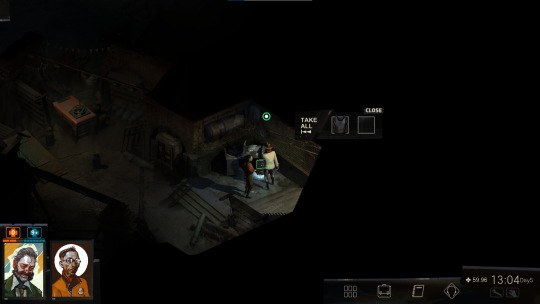

INSANE MESH TANK TOP
+1 Drama: Clinically insane
Where did you even get that one? No really, who put it in that drawer. No further comments. Wear it at your own risk.
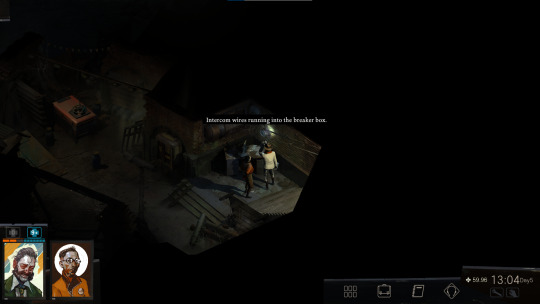
Intercom wires running into the breaker box.
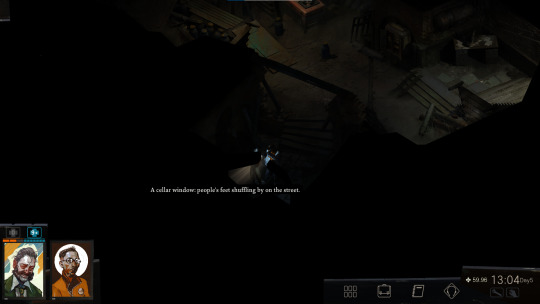
A cellar window: people's feet shuffling by on the street.
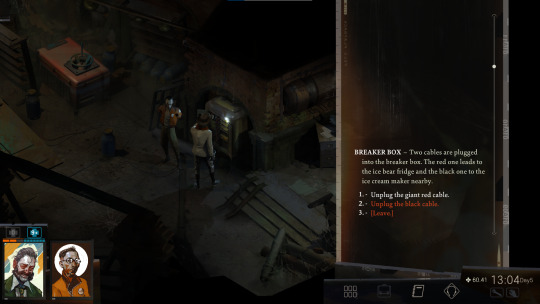
BREAKER BOX - Two cables are plugged into the breaker box. The red one leads to the ice bear fridge and the black one to the ice cream maker nearby.
Unplug the giant red cable.
Unplug the black cable.
[Leave.]
BREAKER BOX - An electric sizzle! The room is slightly quieter now.
Maybe turning the ice bear fridge off will help stay the curse. A little.
2. Unplug the black cable.
BREAKER BOX - Something close to you dies with a soft electric purr.
KIM KITSURAGI - "Why did you do that?"
"It's black, it's not like it's the red one."
"Because it's black, the colour of immeasurable cosmos."
"I don't know why I unplugged it, I do things without any reason."
KIM KITSURAGI - The lieutenant raises his brows, but doesn't say anything. The electric distribution board now has one cable missing.
3. [Leave.]
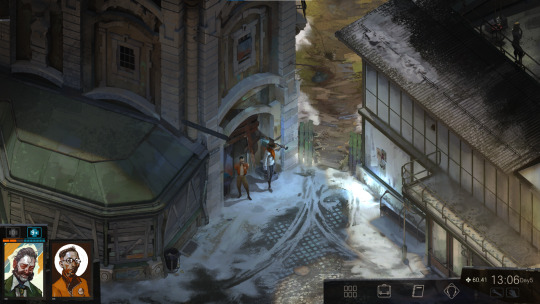
Before we continue, I just want to show that these stairs lead to this door, which we can now open from this side.
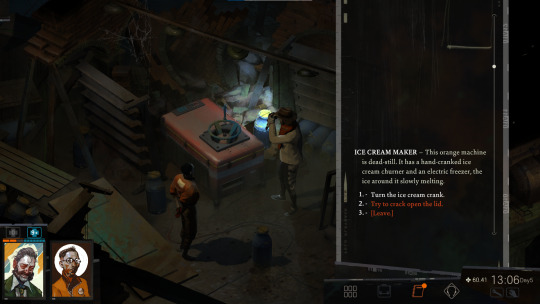
ICE CREAM MAKER - This orange machine is dead-still. It has a hand-cranked ice cream churner and an electric freezer, the ice around it slowly melting.
Turn the ice cream crank.
Try to crack open the lid.
[Leave.]
ICE CREAM MAKER - Turning the crank feels oddly satisfying, like stirring your childhood dreams... In the distance you hear water dripping.
INLAND EMPIRE [Easy: Success] - It's all gone now. You never became a poet or an entroponaut.
ELECTROCHEMISTRY [Medium: Success] - What better to assuage the creeping sense of failure than some frozen fat and sugar?
2. Try to crack open the lid.
ICE CREAM MAKER - You slip your fingers under the frozen lid, but the ice is too cold for you to get a good grip. A prybar would come handy here... or something stronger, like the Kvalsund KR+2 Multi-Tool.
KIM KITSURAGI - "Didn't Soona give you a perfect tool for this kind of job -- the Kvalsund? You should take it out."
TUTORIAL AGENT - Equip the MULTI-TOOL by going to the TOOLS tab in your INVENTORY. From there, you can equip it to a HELD slot.
Yeah, ok, I got it the first time.
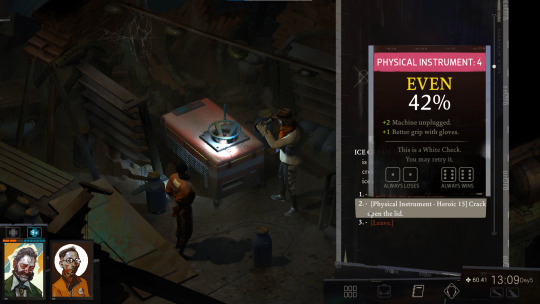
2. [Physical Instrument - Heroic 15] Crack open the lid.
+2 Machine unplugged. +1 Better grip with gloves.

PHYSICAL INSTRUMENT [Heroic: Success] - Ice groans and howls under the strain of your giant Kvalsund multitool -- until the lid cracks open.
ICE CREAM MAKER - Darkness lies inside, but you can faintly make out an object, intricate and foreign, left there for a sub-zero beauty sleep -- a filament memory with the words "OFF-SITE COPY" written on its side.
ELECTROCHEMISTRY [Medium: Success] - Disappointment washes over you as you stare into the almost-empty ice cream maker.
"What? No ice cream..."
Take the filament memory.
KIM KITSURAGI - "A scoop of ice cream would have been nice, yes," the lieutenant agrees. Someone's stomach grumbles. The room feels very cold.
Take the filament memory.
ICE CREAM MAKER - You gently lift the cube from its frosty bedding, careful to not damage it.
Item Gained: "Off-Site Copy" Filament Memory
KIM KITSURAGI - "We should take it back to Miss Luukanen-Kilde as soon as possible. I'm not sure how well unused filaments tolerate room temperatures."
INTERFACING [Easy: Success] - Yes, but aren't you curious to know what's on the precious filament? There's a radiocomputer upstairs...
[Close the lid.]
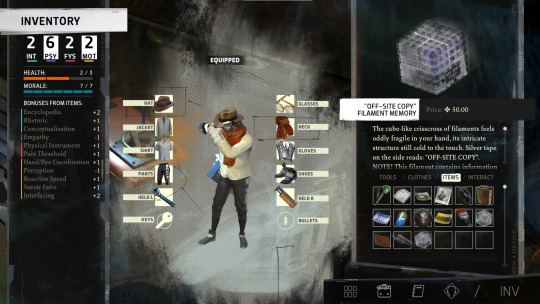
"OFF-SITE COPY" FILAMENT MEMORY
The cube-like crisscross of filaments feels oddly fragile in your hand, its intricate structure still cold to the touch. Silver tape on the side reads: OFF-SITE COPY. NOTE! This filament contains information that can be read using a radiocomputer.
You know, I *do* want to know.
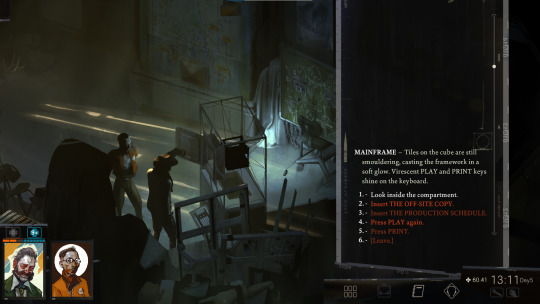
MAINFRAME - Tiles on the cube are still smouldering, casting the framework in a soft glow. Virescent PLAY and PRINT keys shine on the keyboard.
2. Insert THE OFF-SITE COPY.
MAINFRAME - Like a smooth drawer, the filament slides into place. On the keyboard, the PLAY key starts blinking.
+5 XP
3. Press PLAY again.
MAINFRAME - The speaker comes to life, static seeps through the machine's planar magnetic driver. An old lady greets you, her voice sounds a hundred years old...
EAST-INSULINDIAN REPEATER STATION - "Good afternoon, Fortress Accident on Rue de Saint-Ghislaine, this is East-Insulindian Repeater Station 1."
"Please repeat, is this the off-site copy?"
2. "I might have a password for the off-site copy."
EAST-INSULINDIAN REPEATER STATION - "Good. Please repeat the password."
Say: "After life -- death."
EAST-INSULINDIAN REPEATER STATION - Her answer is short and sharp: "No, that's not it."
HALF LIGHT [Medium: Success] - What does she mean *that's not it*?! What's the password then???
CONCEPTUALIZATION [Medium: Success] - Maybe it's the second part of the leitmotiv you saw on the stained glass window.
Say: "After death -- life again."
EAST-INSULINDIAN REPEATER STATION - "Good, I've unlocked the off-site copy. After ending the call, please press PRINT to access the filament."
CONCEPTUALIZATION - *Ka-ching*!
EAST-INSULINDIAN REPEATER STATION - "Fortress Accident, is there anything else I can do for you today?"
3. "That's all for now." (Press OFF/SILENT.)
EAST-INSULINDIAN REPEATER STATION - "Thank you and good bye," the old lady's voice disappears along with the static.
MAINFRAME - Tiles on the cube are still smouldering, casting the framework in a soft glow. Virescent PLAY and PRINT keys shine on the keyboard.
4. Press PRINT.
MAINFRAME - It sounds like something cracks, before the piece of paper starts filling up with pure black ink.
INTERFACING [Medium: Success] - Something's broken. Machines aren't supposed to behave like this.
2. Remove THE OFF-SITE COPY.
MAINFRAME - The filament slides out of its glowing nest.
7. [Leave.]
Well, I think we've done enough for one day. Tomorrow we'll confront *The Entity*.
10 notes
·
View notes